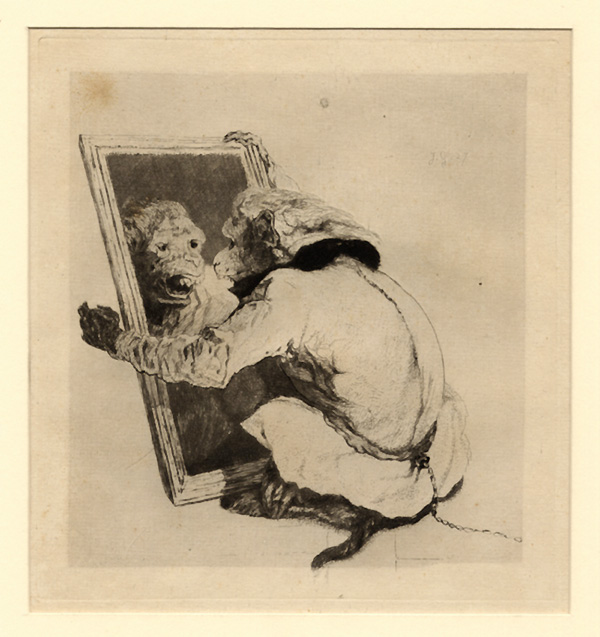Bizarre
- Lepic, Ce qui Restait du Puissant Guillaume de Naillac
- Claeaz, Dancers with Death
- Anonymous American, A Naked Man and Horse
- Klinger, Amor, Tod und Jenseits (Love, Death and the Hereafter)
- Surugue, La Folie pare la Décrépitude
- Legros, La Légende du Bonhomme Misère : La Mort dans le Poirier
- Rops, L’Enlèvement
- Sadeler, Allegory of Opulence, Fornication and Stupidity
- Mohlitz, La Vierge aux Étrons (The Virgin of Turds)
- Legrand, Épaves de Famille (Oddballs of the Family)
- Jacquemart, L’Écurueil (sic)
- Benassit, L’Absinthe!
- de Bry, Punishment of the Mutinous Indians
- Goncourt, Le Singe au Miroir (The Monkey at the Mirror)
- Callot, Les Martyrs du Japon
- Dillon, Les Mendiants (The Beggars)
- Barberis, The Witch
- Budzinski, The Thirsty Giant
- Meryon, Le Ministère de la Marine
- Torre-Bueno, Death’s Arrival
- van Meurs, Animals of America
- Redon, Félinerie
- Chagall, Le Vixe
- Martin, Indécision (Tête de Femme)
- Rops, Le Calvaire
- Rops, Les Frères de la Bonne Trogne
- Gillray, Tentanda via est qua ve quoque possim Tollere humo
- Underwood, Simian Ecstasy
- Veber, Beheaded!
- Strang, Death and the Ploughman’s Wife: Frontispiece
- Corman, The Temptation of Saint Anthony
- Bliss, Gargoyles Spouting
- Castellón, Of Land and Sea
- Eichenberg, Isaiah 11
- Rops, L’Idole (The Idol)
- Master MZ, Aristotle and Phyllis
- Bracquemond, “Hors de mon soleil, canailles!"
- Spare, Nemesis
- Higgens, Forgotten
- Anonymous, Jewish Amulet to Protect Mother and Child
- Daumier, Une Expérience Qui Réussit Trop Bien
- Seligmann, Le Roi du Charbon (King Charcoal)
- Braun, The Release of Force
- Callot, Le Grand Rocher
- Forest, Bâstard Foetus Hérédité, Comte D’Averton Mort-Né
- Jacque, La Souricière
- Veber, “Ah! Qu’il fait chaud"
- Pastelot, Les Sorcières
- Lepic, Le Verger du Roi Louis (The Orchard of King Louis)
- Grandville, Résurrection de la Censure
- Tidemann, The Earth Swallows Up the People of Korah
- Shields, The Descent
- Redon, C’est le diable
- Sadeler, Ita Erit et Aventus Filii Hominis
| 14. Jules de Goncourt (1830-1870) after Gabriel Decamps (1803-1860) Le Singe au Miroir (The Monkey at the Mirror) |
(click on image to print)

Le Singe au Miroir (The Monkey at the Mirror)
Etching and drypoint, ca. 1865, 160 x 149 mm., Burty 30, Béraldi 4. Fine impression on laid paper with large margins; a few spots of foxing on the sheet, one in the upper left corner of the image. On a lighter (?) note: this robed monkey’s encounter with a mirror. The expression is difficult to fathom.
Surprise, yes, but horror at what the mirror reveals? Or does he see an adversary rather than himself? Or does the image presciently illustrate the immortal line from Pogo: “We have met the enemy and he is us.” A singerie-songerie, to quote the poet Eugene Walter.
![]()